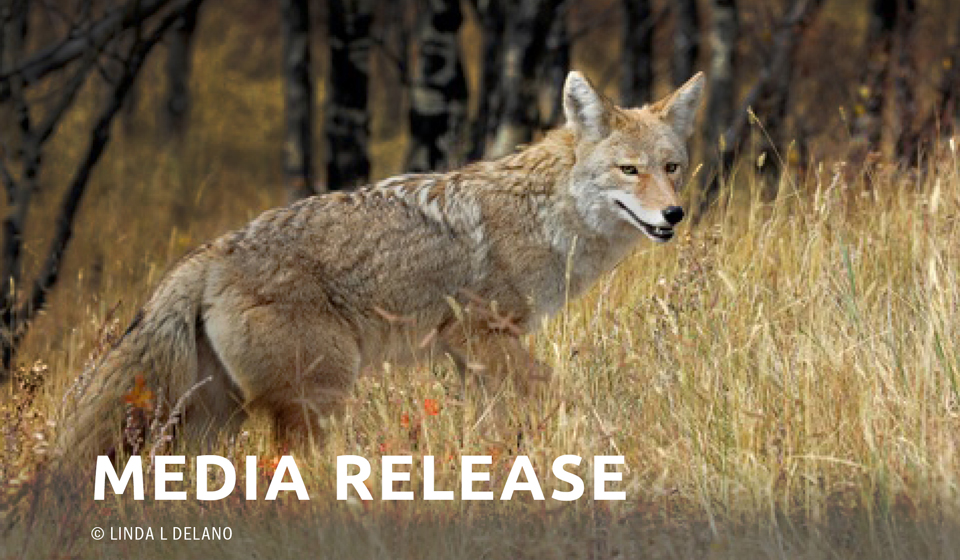For Immediate Release: September 11, 2020
Washington becomes seventh U.S. state to outlaw cruel and unsporting wildlife killing contests
Washington Fish and Wildlife Commission votes to end competitive killing
of coyotes, bobcats, foxes, crows and other species for prizes
SEATTLE (September 11, 2020)—A coalition of state and national wildlife protection organizations is applauding the Washington Fish and Wildlife Commission for its vote today banning wildlife killing contests, in which participants compete to kill the most, the largest, or even the smallest animals for cash and prizes. The new rule, put forth by the Washington Department of Fish and Wildlife, prohibits the killing of unprotected species including coyotes, bobcats, crows, foxes and raccoons as part of a contest. Contest participants killed at least 1,427 in these events in Washington between 2013 and 2018.
Washington joins six other states—Arizona, California, Colorado, Massachusetts, New Mexico and Vermont—that have taken a stand against cruel, unsporting and wasteful wildlife killing contests. California banned the awarding of prizes for killing furbearing and nongame mammals in 2014; New Mexico and Vermont outlawed coyote killing contests in 2019 and 2018, respectively; Arizona and Massachusetts prohibited killing contests that target predator and furbearer species in late 2019; and in April 2020, the Colorado Parks and Wildlife Commission voted to ban wildlife killing contests for furbearer and certain small game species in the state.
“The majority of Washingtonians respect and value wildlife and this step forward by our Commission is in line with those values,” said Washington Fish and Wildlife Commissioner Barbara Baker, who championed this issue with her fellow commissioners. “As stewards of our state’s wildlife, prohibiting a practice that contravenes sound wildlife conservation, fails to increase game populations and harms ecosystems is simply the right decision.”
“Today, Washington became the seventh state in the country to ban wildlife killing contests, sending a message to the nation that the senseless killing of animals for cash and prizes does not belong in a civilized society,” said Dan Paul, Washington senior state director for the Humane Society of the United States. “We applaud the Washington Fish and Wildlife Commission for passing this rule, which recognizes that the vast majority of the state’s citizens will not tolerate this reprehensible practice. We urge other states to follow.”
“Wildlife killing contests are a bloodsport just like dogfighting and cockfighting, which have been outlawed nationwide,” said Camilla Fox, founder and executive director of Project Coyote. “We commend Commissioner Baker and the entire Washington Fish and Wildlife Commission for relegating these ecologically and ethically indefensible events to the history books.”
“The decision to ban these cruel killing sprees is a vital step in promoting scientific management of the state’s native wildlife and aligning our laws with the values of the majority of the people of Washington,” said Sophia Ressler, Washington wildlife advocate and staff attorney at the Center for Biological Diversity.
“We appreciate and respect the action taken by the Washington Fish and Wildlife Commission and the work of the WDFW staff that enabled passage of this rule,” said Diane Gallegos, executive director of Wolf Haven International. “Wildlife killing contests do not reflect traditional hunting values, science knowledge or humane treatment of wildlife. All animals deserve to be treated with respect and indiscriminate killing of wildlife for prizes has no place in today’s wildlife conservation ethic.”
Wildlife agencies and professionals across the country have expressed concerns about killing contests because they reflect poorly on responsible sportsmen and sportswomen. In the last two years, the Arizona Game and Fish Commission, the Massachusetts Fisheries and Wildlife Board and the Colorado Parks and Wildlife Commission voted to prohibit these gruesome killing contests, citing the grave damage that such events could inflict on the image of hunting in their states. Wildlife management professionals have also noted that wildlife killing contests contravene modern, science-based wildlife management principles.
In 2018, Project Coyote’s Science Advisory Board, together with more than 70 renowned conservation scientists, issued a statement citing peer-reviewed science that refutes claims that indiscriminately killing predators permanently limits their populations, increases the number of deer or other game species for hunters, or reduces conflicts with humans, pets or livestock. In fact, randomly shooting coyotes and other wild carnivores can disrupt their social structures, leading to increases in their populations and more conflicts. Nonlethal, preventive measures are most effective at reducing conflicts with wildlife. Wildlife killing contests are also destructive to healthy ecosystems, within which all wildlife species play a crucial role. For example, coyotes and other targeted species help to control rabbit and rodent populations and restrict rodent- and tick-borne disease transmission.
#
Project Coyote, a national non-profit organization, is a North American coalition of scientists, educators, ranchers, and citizen leaders promoting compassionate conservation and coexistence between people and wildlife through education, science and advocacy. Visit ProjectCoyote.org for more information.
Founded in 1954, the Humane Society of the United States and its affiliates around the globe fight the big fights to end suffering for all animals. Together with millions of supporters, the HSUS takes on puppy mills, factory farms, trophy hunts, animal testing and other cruel industries, and together with its affiliates, rescues and provides direct care for over 100,000 animals every year. The HSUS works on reforming corporate policy, improving and enforcing laws and elevating public awareness on animal issues. More at humanesociety.org. Subscribe to Kitty Block’s blog, A Humane World. Follow the HSUS Media Relations department on Twitter. Read the award-winning All Animals magazine. Listen to the Humane Voices Podcast.
The Center for Biological Diversity is a national, nonprofit conservation organization with more than 1.7 million members and online activists dedicated to the protection of endangered species and wild places.
Wolf Haven International is a globally accredited Wolf sanctuary that has rescued and provided a lifetime home for over 300 displaced, captive-born animals since 1982. Our mission is to conserve and protect wolves and their habitat.


